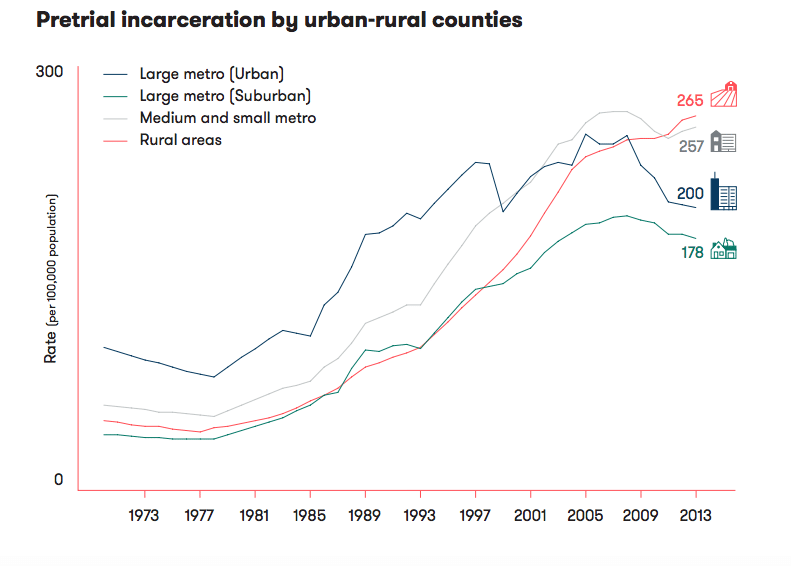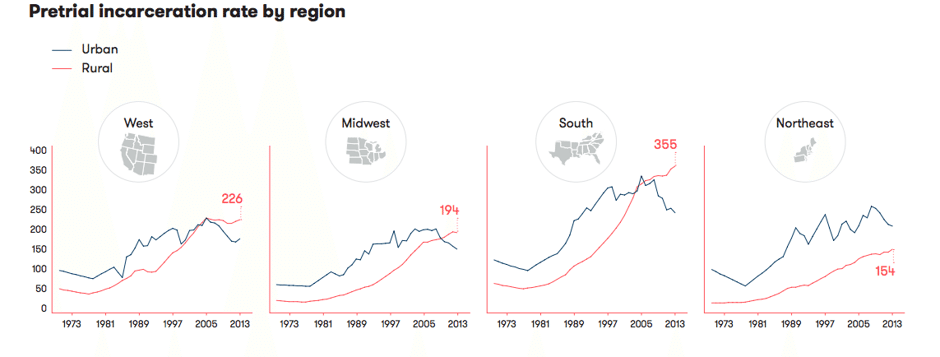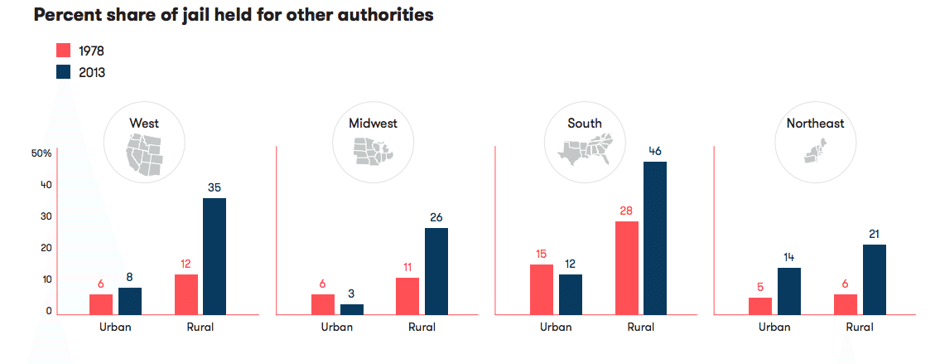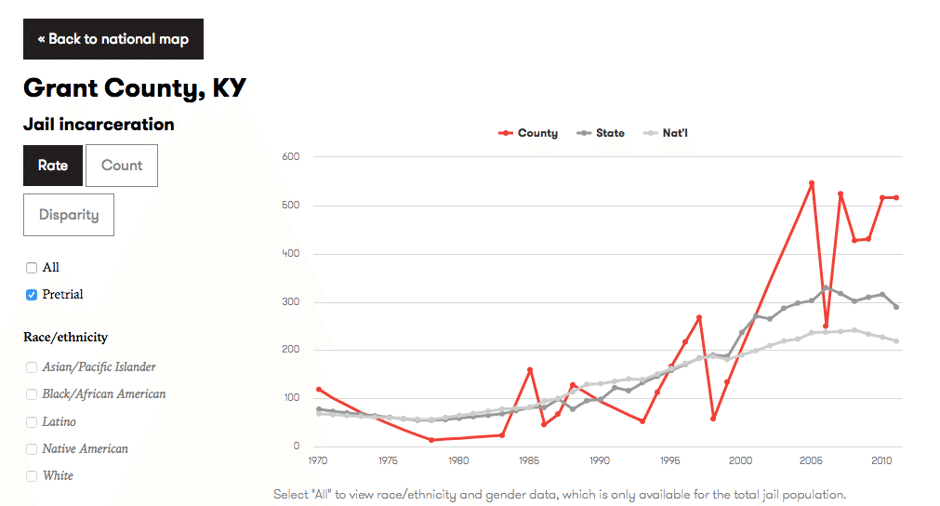Connecting state and local government leaders
Local jails in smaller counties are seeing enormous growth. A new report explains why.
Local jails are booming: Between 1970 and 2015, the number of people incarcerated in the 3,000-plus county and municipal facilities in the U.S. has ballooned—from 150,000 to 700,000 per day.
Contrary to popular perception, it’s not high-crime cities that are fueling the jailing explosion. According to a new report by the Vera Institute of Justice, the geography of incarceration has shifted to smaller, rural counties. These are the places driving the increase in local jail population since the 1970s; Urban jails, while still massive, have seen the least growth.
As my colleague Brentin Mock recently explained, these trends are not a reaction to crime. Crime rates have fallen everywhere in the U.S, and in rural areas, which are now the epicenters of this boom, they’ve always been lower. A better explanation is that the way these jails are being used has changed. One, more people are being held at these facilities before they’re convicted of a crime—in pretrial detention. And two, federal agencies such as Immigration and Customs Enforcement (ICE) and the U.S. Marshals Service are renting out beds for their detainees.
The Vera Institute report, written by Jacob Kang-Brown and Ram Subramanian, confirms these reasons, and breaks down how they play out in different regions across the U.S. It finds that the rise of pretrial detention rates have been particularly drastic in rural counties, up 436 percent between 1970 and 2013. That means 200 people are stuck in rural prison, at some stage of criminal justice limbo, for every 100,000 residents. Either they’re unable to afford bail bonds, unable to get a speedy court hearing, or (in places like Missouri and Louisiana) unable to gain access to a public defender to argue their case. Over the years, this rural pretrial incarceration rate has climbed higher than it has in urban and suburban areas:

Southern and Western rural counties have the highest pretrial incarceration rates, at 335 and 226 per 100,000, respectively. The ones in the Northeastern and Midwestern are much lower, but have still seen steep increases since the 1970s.

It all comes down to lack of resources. Cash-strapped rural counties have fewer personnel—judges, prosecutors, investigators, public defenders, and court administrators—and they’re spread thin over larger areas. That translates to limited hours for criminal justice procedure and more processing time. Some counties in Georgia, Montana, Oklahoma, Nevada, and Utah, for example, only schedule district court hearings a few times a month or a year. That means people are waiting behind bars until their bail is set. Longer travel times and lack of supervision in the pretrial period makes it more likely for the accused to miss appointments and violate the conditions of bail, which can put them right back in the slammer. Plus, cities with resources can afford diversion programs that keep people with mental health or substance abuse issues out of prison. Many rural counties don’t have the resources.
On their website, the Vera Institute has an interactive map showing the pretrial incarceration rate for each county. On the top left is a timeline, which lets users see change over time.
For poor rural towns with sparse economic activity, renting out jail space to state and federal authorities appears to be a lucrative hustle. Some are even spending taxpayer dollars to expand capacity so they can cash in on the demand for jail beds, which is likely to rise under the current administration. Per the report:
Some counties, such as those in Kentucky, Louisiana, Mississippi, Oklahoma, and Tennessee, have come to rely on a consistent flow of state prisoners or detained undocumented immigrants—and thus money from the state or federal government—to sustain basic system operations, from staff salaries, to patrol cars, to equipment.
It makes sense. The Justice Department is planning on ramping up prosecutions of minor drug crimes, and expand detention and deportation of undocumented immigrants. While private prison companies are champing at the bit to provide the expanded detention capacity the government wants, local jails already have that infrastructure in place—and are eager to ring up the diem payments for their jail space.
That’s why the rates of jailing people for other authorities has risen acutely in rural America—a striking 888 percent since the 1970s, according to the Vera Institute. The next steepest increase occurred in medium-sized metros, at 486 percent. Here’s a breakdown by region:

But this business of renting out jail beds isn’t always a win-win. Although some counties bag short-term economic benefits, the “net positive effect is unclear,” says Kang-Brown, who co-authored the report. Prison jobs aren’t the greatest: Many are low-wage, high-stress positions that go to young workers who don’t have much training. The result is high turnover. And sometimes, the employees that end up working these jobs drive in from another county.
Agreements with state and federal governments can also backfire. That’s what happened in Grant County, Kentucky, which boosted its beds from 28 to 300 in 1990s to help cover law enforcement costs. One immediate consequence was that the pretrial detention rate spiked—growing to 4 times what it was before (in chart below). In the 2000s, the Justice Department found gross violations of inmates’ rights at this facility. When the state government pulled out its prisoners, the county was saddled with the construction debt and maintenance costs.

Criminal justice reformers have been coming up with creative solutions to close down prisons in the Trump era. But the causes, costs, and incentives that are fueling the rural jail boom need renewed attention; the fight against mass incarceration doesn’t end at the city limits.
This article is part of CityLab's project “The Presence of Justice,” which is supported by a grant from the John D. and Catherine T. MacArthur Foundation’s Safety and Justice Challenge.
Tanvi Misra is a staff writer for CityLab, where this article was originally published.

NEXT STORY: Interactive Medical Drones: No Longer Science Fiction



